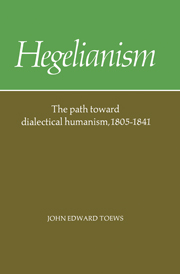Book contents
- Frontmatter
- Contents
- Preface
- Introduction: the Hegelian project in ideological perspective
- PART I PHILOSOPHY AND CULTURAL INTEGRATION: HEGEL IN CONTEXT
- PART II THE HISTORICAL APPROPRIATION OF THE ABSOLUTE: UNITY AND DIVERSITY IN THE HEGELIAN SCHOOL, 1805–1831
- 4 Hegel and Hegelianism: disciples and sympathizers in the formation of the Hegelian school
- 5 Hegelian politics during the Restoration: accommodation, critique, and historical transcendence
- 6 Christian religion and Hegelian philosophy during the Restoration: accommodation, critique, and historical transcendence
- PART III THE REDUCTION OF THE ABSOLUTE TO “MAN”: THE DIVISION OF THE SCHOOL AND THE EMERGENCE OF THE HEGELIAN LEFT, 1830–1841
- EPILOGUE: BEYOND “MAN” – THE RISE AND FALL OF LEFT HEGELIAN HUMANISM
- Notes
- Bibliography
- Index
4 - Hegel and Hegelianism: disciples and sympathizers in the formation of the Hegelian school
Published online by Cambridge University Press: 08 January 2010
- Frontmatter
- Contents
- Preface
- Introduction: the Hegelian project in ideological perspective
- PART I PHILOSOPHY AND CULTURAL INTEGRATION: HEGEL IN CONTEXT
- PART II THE HISTORICAL APPROPRIATION OF THE ABSOLUTE: UNITY AND DIVERSITY IN THE HEGELIAN SCHOOL, 1805–1831
- 4 Hegel and Hegelianism: disciples and sympathizers in the formation of the Hegelian school
- 5 Hegelian politics during the Restoration: accommodation, critique, and historical transcendence
- 6 Christian religion and Hegelian philosophy during the Restoration: accommodation, critique, and historical transcendence
- PART III THE REDUCTION OF THE ABSOLUTE TO “MAN”: THE DIVISION OF THE SCHOOL AND THE EMERGENCE OF THE HEGELIAN LEFT, 1830–1841
- EPILOGUE: BEYOND “MAN” – THE RISE AND FALL OF LEFT HEGELIAN HUMANISM
- Notes
- Bibliography
- Index
Summary
In 1807, Hegel claimed that “the individual needs public acceptance to prove the truth of what is as yet his solitary concern; he needs to see how the conviction that is as yet particular becomes general.” When Hegel made this claim he was confident that his “particular” view of the nature and historical role of philosophy would become “general,” that his subjective conviction would attain the historical verification of public acceptance. “We must have the conviction,” he wrote, “that it is of the nature of truth to prevail when its time has come and that truth appears only when its time has come – and thus never appears too early, and never finds the public that is not ready for it.” The emergence of a Hegelian “movement” or “school” in the years after 1816 appeared to confirm Hegel's belief that his truth was more than a solitary, subjective conviction. It is obvious, however, that the historical verification of Hegel's viewpoint through public acceptance was severely limited in scope. Although his truth may have prevailed among a significant number of students and academics and a few public officials, primarily in Prussia, it certainly never became the “property of all.” Even within the confines of the Hegelian school, moreover, the appropriation of Hegel's truth took such a variety of forms that the identity of the individual and the universal, the subjective and the objective, often seemed very tenuous indeed.
- Type
- Chapter
- Information
- HegelianismThe Path Toward Dialectical Humanism, 1805–1841, pp. 71 - 94Publisher: Cambridge University PressPrint publication year: 1981

